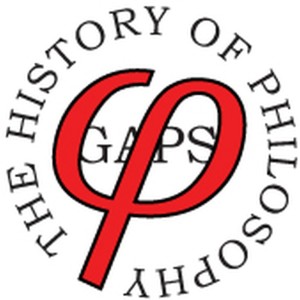Episodes

Sunday May 25, 2025
HoP 470 Gary Hatfield on Descartes' Meditations
Sunday May 25, 2025
Sunday May 25, 2025
We're joined in this episode by a leading expert on one of the most famous works of philosophy ever written: Descartes' Meditations.

Sunday Apr 27, 2025
HoP 468 Perchance to Dream: Descartes’ Skeptical Method
Sunday Apr 27, 2025
Sunday Apr 27, 2025
How Descartes fashioned a “method” to repel even the strongest and most radical forms of doubt, with the cogito argument as its foundation.

Sunday Apr 13, 2025
HoP 467 Written in Mathematics: Descartes’ Physics
Sunday Apr 13, 2025
Sunday Apr 13, 2025
For Descartes body is purely geometrical. So how does he understand features we can perceive, like color, and causation between bodies?

Sunday Mar 30, 2025
HoP 466 Well Hidden: Descartes’ Life and Works
Sunday Mar 30, 2025
Sunday Mar 30, 2025
How René Descartes’ understanding of his own intellectual project evolved across his lifetime.

Sunday Mar 02, 2025
HoP 464 Howard Hotson on the Republic of Letters
Sunday Mar 02, 2025
Sunday Mar 02, 2025
In this interview we learn more about the Republic of Letters: its importance for the history of ideas, it geographic breadth, who was involved, and the contributions of figures including Leibniz and Hartlib.

Sunday Feb 16, 2025
HoP 463 Doctors without Borders: the Republic of Letters
Sunday Feb 16, 2025
Sunday Feb 16, 2025
How scholars around Europe created an international network of intellectual exchange. As examples we consider the activities of Mersenne, Peiresc, Leibniz, Calvet, and Hartlib.

Sunday Feb 02, 2025
HoP 462 Freedom to Philosophize: Introduction to Early Modern Philosophy
Sunday Feb 02, 2025
Sunday Feb 02, 2025
What is Enlightenment, anyway?

Sunday Jan 19, 2025
HoP 461 - Eileen Reeves on Galileo and the Telescope
Sunday Jan 19, 2025
Sunday Jan 19, 2025
We finish our look at philosophy in the Reformation era with an interview about Galileo's use of a revolutionary technology: the telescope.

Sunday Jan 05, 2025
HoP 460 - Trial and Error - Galileo and the Inquisition
Sunday Jan 05, 2025
Sunday Jan 05, 2025
The philosophical issues at the heart of the notorious condemnation of Galileo and Copernican astronomy.

Sunday Dec 22, 2024
HoP 459 - Cardinal Rule - Robert Bellarmine
Sunday Dec 22, 2024
Sunday Dec 22, 2024
Though most famous for his role in persecuting Galileo, Robert Bellarmine was a central figure of the Counter-Reformation, especially in his political thought.

Sunday Nov 24, 2024
HoP 457 - Take Your Medicine - Oliva Sabuco and Camilla Erculiani
Sunday Nov 24, 2024
Sunday Nov 24, 2024
Natural philosophy and medicine in the work of two unorthodox thinkers of the late sixteenth century, both of them women.

Sunday May 12, 2024
HoP 445 - Band of Brothers - the Jesuits
Sunday May 12, 2024
Sunday May 12, 2024
Ignatius of Loyola’s movement begins modestly, but winds up having a global impact on education and philosophy.

Sunday Mar 03, 2024
HoP 440 - Longitudinal Studies - Exploration and Science
Sunday Mar 03, 2024
Sunday Mar 03, 2024
Iberian expeditions to the Americas inspire scientists, and Matteo Ricci’s religious mission to Asia becomes an encounter between European and Chinese philosophy.

Sunday Jan 21, 2024
HoP 437 - Jennifer Rampling on Renaissance Alchemy
Sunday Jan 21, 2024
Sunday Jan 21, 2024
An expert on Renaissance alchemy tells us how this art related to philosophy at the time... and how she has tried to reproduce its results!

Sunday Jan 07, 2024
HoP 436 - Unpathed Waters, Undreamed Shores - Robert Fludd
Sunday Jan 07, 2024
Sunday Jan 07, 2024
Our last figure of the English Renaissance undertakes daring investigations of chemistry, medicine, agriculture, and cosmology – and gets accused of magic and Rosicrucianism.

Sunday Dec 24, 2023
HoP 435 - Metal More Attractive - William Gilbert and Magnetism
Sunday Dec 24, 2023
Sunday Dec 24, 2023
The cosmological and methodological implications of breakthroughs in the understanding of magnetism and electricity at the turn of the 17th century.

Sunday Dec 10, 2023
HoP 434 - The Eye Sees Not Itself But By Reflection - Theories of Vision
Sunday Dec 10, 2023
Sunday Dec 10, 2023
Changing ideas about eyesight, light, mirror images, and refraction – and the skeptical worries they may have inspired.

Sunday Nov 26, 2023
HoP 433 - Nature’s Mystery - Science in Renaissance England
Sunday Nov 26, 2023
Sunday Nov 26, 2023
How scientists of the Elizabethan age anticipated the discoveries and methods of the Enlightenment (without necessarily publishing them).

Sunday Nov 12, 2023
HoP 432 - If This Be Magic, Let It Be an Art - John Dee
Sunday Nov 12, 2023
Sunday Nov 12, 2023
Science, intrigue, exploration, angelic seances! It's the life and thought of Elizabethan mathematician and magician John Dee.

Sunday Oct 29, 2023
HoP 431 - Calvin Normore on Scholasticism
Sunday Oct 29, 2023
Sunday Oct 29, 2023
A discussion of the history and philosophical significance of scholasticism from medieval times to early modernity, and even today.

